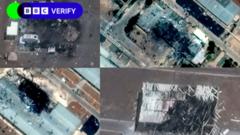While Israel's military actions against Iran complicate diplomatic relations, Iranian officials express openness to negotiations concerning their nuclear program, highlighting a complex landscape as both nations navigate potential reconciliation or further conflict.
Renewed Diplomatic Efforts Possible Amid Ongoing Israel-Iran Tensions

Renewed Diplomatic Efforts Possible Amid Ongoing Israel-Iran Tensions
As Israel and Iran face escalating conflict, the potential for renewed negotiations over Iran's nuclear program remains, despite recent military actions.
In the current climate of escalating tensions between Israel and Iran, the possibility of resuscitating diplomatic discussions regarding Iran's nuclear ambitions should not be overlooked. Israeli Prime Minister Benjamin Netanyahu maintains that his government’s military actions against Iran serve as a necessary pre-emptive measure to thwart Tehran's nuclear weapons development. This has unfolded even as the U.S. was poised to engage in a new round of negotiations with Iran.
Iran’s Foreign Minister, Abbas Araghchi, has voiced the nation’s readiness to engage in discussions surrounding a nuclear deal. He emphasized that any agreement would need to respect Iran's sovereign rights to enrich uranium for civilian purposes, a demand that underscores a key point of contention in ongoing negotiations. Iran's position reflects its commitment to the provisions of the Nuclear Nonproliferation Treaty, which allows for civilian nuclear activity.
Araghchi has been vocal about the belief that Israel's attacks are strategically aimed at obstructing diplomacy rather than genuinely addressing nuclear proliferation concerns. Various analysts concur with this viewpoint, suggesting Israel seeks to dismantle any form of agreement that would permit Iran to maintain a nuclear enrichment capability. Netanyahu's stance appears driven by fears of a nuclear-capable Iran, which he perceives as a direct threat to Israel’s security and existence.
Conversely, former President Donald Trump has indicated a desire to see diplomatic negotiations succeed, reportedly anticipating that Israel's military actions could compel Iran to engage more readily in talks from a position of weakened strength. Yet, these anticipated negotiations face significant hurdles as Iran remains steadfast in its insistence on preserving its right to uranium enrichment.
Experts like Vali Nasr highlight the precarious nature of Iran's internal politics and suggest that any hasty deal yielding an end to enrichment could be interpreted as a capitulation, undermining the regime's standing domestically. The persistence of these discussions, even amidst rising military hostilities, serves as a reminder that diplomatic avenues could still be explored, although with numerous challenges ahead as both sides vie for geopolitical dominance.
Iran’s Foreign Minister, Abbas Araghchi, has voiced the nation’s readiness to engage in discussions surrounding a nuclear deal. He emphasized that any agreement would need to respect Iran's sovereign rights to enrich uranium for civilian purposes, a demand that underscores a key point of contention in ongoing negotiations. Iran's position reflects its commitment to the provisions of the Nuclear Nonproliferation Treaty, which allows for civilian nuclear activity.
Araghchi has been vocal about the belief that Israel's attacks are strategically aimed at obstructing diplomacy rather than genuinely addressing nuclear proliferation concerns. Various analysts concur with this viewpoint, suggesting Israel seeks to dismantle any form of agreement that would permit Iran to maintain a nuclear enrichment capability. Netanyahu's stance appears driven by fears of a nuclear-capable Iran, which he perceives as a direct threat to Israel’s security and existence.
Conversely, former President Donald Trump has indicated a desire to see diplomatic negotiations succeed, reportedly anticipating that Israel's military actions could compel Iran to engage more readily in talks from a position of weakened strength. Yet, these anticipated negotiations face significant hurdles as Iran remains steadfast in its insistence on preserving its right to uranium enrichment.
Experts like Vali Nasr highlight the precarious nature of Iran's internal politics and suggest that any hasty deal yielding an end to enrichment could be interpreted as a capitulation, undermining the regime's standing domestically. The persistence of these discussions, even amidst rising military hostilities, serves as a reminder that diplomatic avenues could still be explored, although with numerous challenges ahead as both sides vie for geopolitical dominance.




















